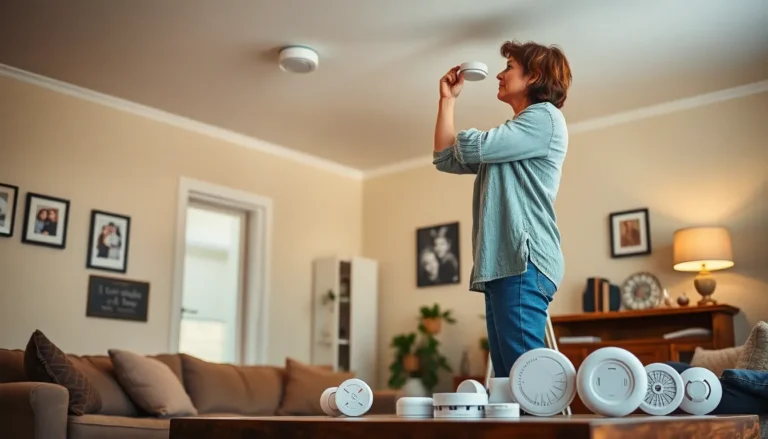In a world where life’s demands can feel like a circus act, juggling work, family, and personal time often leaves little room for self-care. Enter in-home care services, the unsung heroes ready to save the day. Imagine having a superhero at your doorstep, equipped with compassion, expertise, and maybe even a few dad jokes to lighten the mood.
Table of Contents
ToggleOverview of In Home Care Services
In-home care services offer personalized support tailored to an individual’s needs. These services encompass assistance with daily activities such as bathing, dressing, and meal preparation. Caregivers provide companionship, helping to reduce feelings of isolation among seniors.
Various types of in-home care exist, including skilled nursing care, personal care, and respite care. Skilled nursing care involves medical support from licensed professionals, addressing health issues like medication management or post-surgery rehabilitation. Personal care focuses on non-medical assistance, ensuring clients maintain their dignity and comfort at home. Respite care serves as temporary relief for family caregivers, allowing them to take breaks while ensuring their loved ones receive quality care.
Statistics show that in-home care services can improve the quality of life for many individuals. According to a study by AARP, 90% of older adults prefer to age at home, indicating the demand for in-home support. Additionally, research from the National Institute on Aging highlights the positive impact of in-home services on mental well-being, including a decrease in anxiety and depression levels.
Families often benefit from in-home care services as they provide peace of mind while ensuring loved ones receive necessary assistance. Flexibility in scheduling allows caregivers to adapt to each client’s unique routine. By coordinating care plans that fit individual schedules, these services create a supportive environment that enhances overall well-being, promoting independence and comfort in the familiar surroundings of home.
Types of In Home Care Services

In-home care services encompass a range of options designed to meet varied needs. Each type addresses specific requirements of individuals and families.
Personal Care Services
Personal care involves assistance with daily living activities. Caregivers help with tasks like bathing, dressing, grooming, and meal preparation. Support extends to mobility aid, ensuring safety while walking or transferring. Companionship is also a key aspect, helping to alleviate loneliness among seniors. Personalized attention improves confidence and self-esteem, allowing individuals to maintain dignity. Services can adapt to changing needs, ensuring ongoing support that adjusts as circumstances evolve.
Health Care Services
Health care services focus on medical needs within the home environment. Skilled nursing care includes monitoring vital signs, administering medications, and managing chronic conditions. Physical therapy sessions can also be provided, aiding recovery after surgery or injury. Occupational therapy helps individuals regain independence through tailored exercises. These professionals work closely with physicians to develop care plans aligned with medical requirements. Overall, health care services promote both physical wellness and peace of mind for patients and families.
Benefits of In Home Care Services
In-home care services enhance the daily lives of individuals by offering customized support and addressing various needs.
Improved Quality of Life
In-home care significantly enhances quality of life. Daily assistance with activities like bathing and meal preparations promotes independence. Seniors experience increased comfort and familiarity within their own homes. Companionship from caregivers reduces feelings of isolation, fostering emotional well-being. Moreover, studies show that 90% of older adults prefer aging in place, emphasizing the desire for support in a familiar environment. These services adapt to individual preferences, making daily routines more manageable. Mental health improves with care provision, as reduced anxiety and depression levels contribute to overall happiness.
Cost-Effectiveness
In-home care services often prove more cost-effective than other care options. Families save on expenses related to assisted living facilities or nursing homes. The flexibility of scheduling allows tailored services to fit personal budgets and needs. Many insurance plans cover aspects of in-home care, reducing out-of-pocket expenses. Care recipients benefit from avoiding hospital readmissions, contributing to lower overall healthcare costs. Moreover, families experience peace of mind knowing they’re receiving high-quality care in a setting that promotes comfort. This economical approach ensures both financial and emotional benefits for caregivers and recipients alike.
Choosing the Right In Home Care Service
Selecting an appropriate in-home care service requires careful consideration of specific needs and preferences. Understanding those needs sets the foundation for finding the right match.
Assessing Individual Needs
Assess individual health conditions and daily living requirements. Evaluating mobility challenges and cognitive abilities helps determine necessary assistance. Identifying personal preferences, such as companionship and interaction levels, influences caregiver selection. Another factor includes the types of care needed, whether personal care, skilled nursing, or therapy services. Prioritizing these aspects ensures personalized care that enhances quality of life. Enhanced comfort levels arise when individuals receive tailored support within familiar environments.
Questions to Ask Providers
Inquiring about caregiver qualifications remains essential. Ask about experience with specific medical conditions and training in personal care. Understand the scope of services offered, ensuring they align with individual needs. Clarify the availability of caregivers to address scheduling requirements and flexibility. Discuss communication methods between caregivers and families, emphasizing transparency and updates on care progress. Explore how providers assess and adjust care plans, ensuring they adapt to changing needs. Gathering this information builds confidence in choosing a provider that promotes well-being.
Embracing in-home care services can transform the lives of individuals and their families. With personalized support tailored to unique needs these services not only enhance daily living but also foster emotional well-being. The peace of mind that comes from knowing loved ones receive compassionate care at home is invaluable.
As families navigate the complexities of caregiving it’s essential to choose the right provider. This thoughtful selection process ensures that the care aligns with personal preferences and changing needs. By prioritizing in-home care families can promote independence and comfort while allowing their loved ones to thrive in familiar surroundings.





